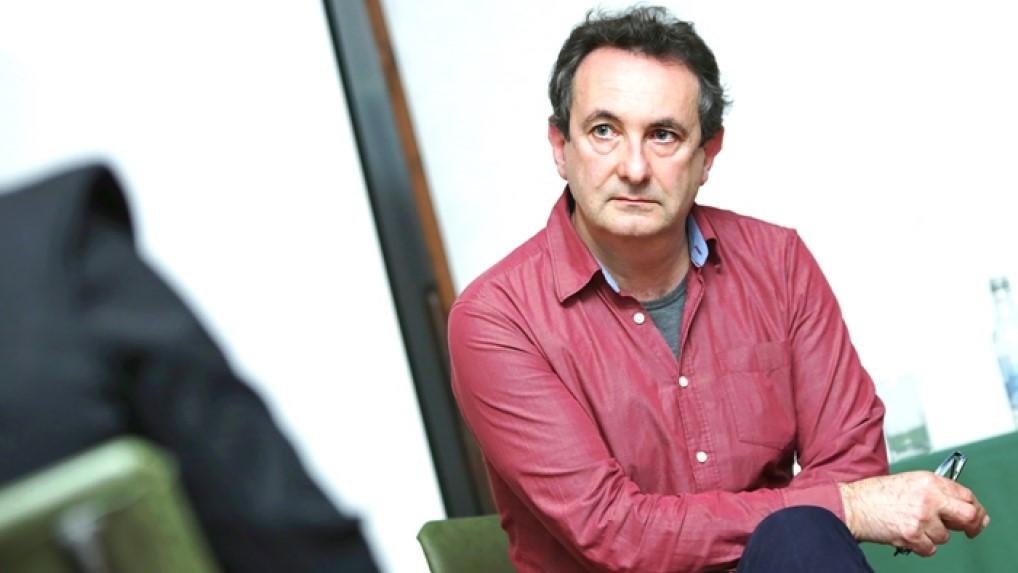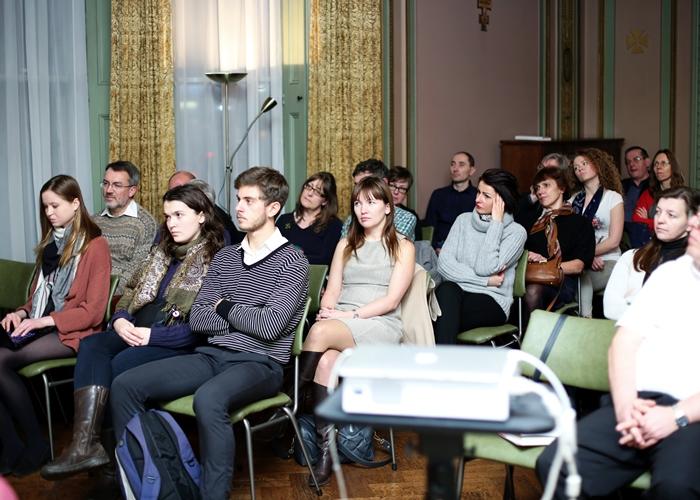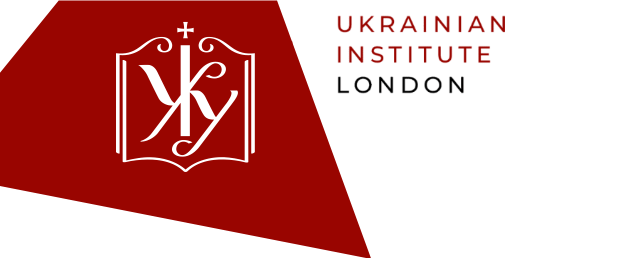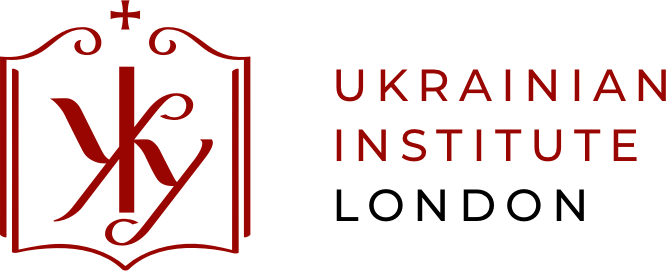Veteran war reporter Tim Judah shared recollections and impressions from the conflict in Ukraine, as well as his thoughts on the country’s future, at a talk at the Ukrainian Institute London on 11 December 2015.

AUTHOR
Maria Terekhova for Ukrainian Institute London.
On Thursday, December 11th, Tim Judah presented his latest book, In Wartime: Stories from Ukraine, in a discussion with Marina Pesenti, Director of the Ukrainian Institute London. The Institute, which resumed its activities in September of this year, hosted an audience of approximately 30 people, who came to hear Judah’s experiences during his time in Ukraine during the conflict which began in 2013. Judah is a veteran war reporter who has travelled through and written about locations which include Serbia, Uganda, and Afghanistan. However, despite his expertise, he nevertheless cheerfully admitted that a recent (very positive) review of his latest book in the Financial Times had greatly pleased him.
Before, there was an absence of books about Ukraine that featured ‘ordinary people’, and that could give people abroad ‘a flavour of the country’.
Judah had spent the past 3 years in Ukraine, travelling both through the east and the west of the country, and began the presentation with a slideshow of photographs he had taken, using them as a window into his own recollections and impressions of the conflict. When an audience member asked Judah why he had written this book, he pointed to the photographs behind him, and said that he believed there was an absence of books about Ukraine that featured ‘ordinary people’, and that could give people abroad ‘a flavour of the country’. Moreover, he wanted to ‘portray Ukraine as a three-dimensional country’. In short, he modestly said, he had believed that there was ‘room for such a book’.
Discussing the format of the book, in which he follows several individuals’ stories, he said that he had chosen this method to counteract a tendency he has noticed across many wars: that after the first few people to die, casualties ‘start to become numbers’. ‘The names in history books will be the first few people to die’, Judah noted – but he wanted to rescue at least a few more from oblivion. However, the narratives he traces include the living as well as the dead, and across both sides of the conflict, both separatists and those seeking to bring Ukraine closer to the West.
There is so much confusion even in places where there shouldn’t be any confusion.
Olga Betko, a London-based TV and radio producer, gave a taster of the book to the audience by reading three extracts from it. This spurred a discussion of the Holodomor (1932-1933), a ‘death by hunger’ engineered by Stalin that killed millions of Ukrainians. After listening to Ukrainians’ recollections of the Holodomor, Judah said he concluded that it ‘has not entered into the DNA of Ukraine’, as it was not ‘clearly something done by others’ – which, Judah says, makes it comparable to the Khmer Rouge genocide. Some of the perpetrators were, uncomfortably, Ukrainians. Judah went on to say that, in his opinion, the world still does not have a sense of Ukraine and Ukrainian history distinct from Russia, and that one of Ukraine’s greatest failures in the years since independence has been to allow such extreme and opposing narratives of events such as the Holodomor to emerge that there is no ‘unified narrative of Ukrainian history available’, either to Ukrainians or the rest of the world. Even in a single small village, people could not agree on the Holodomor’s death toll there, or who had enforced the collectivisation – ‘there is so much confusion even in places where there shouldn’t be any confusion’, Judah said.
The world does not realise how impressive a victory an underfunded Ukrainian army won over Kremlin-backed separatists in the East.
When asked if Donbas has ‘hived off for good’ from Ukraine, Judah noted that we might be looking at a new Transdnistria, ‘a twilight zone of little industry, with an alienated population’ which Ukraine itself might not be eager to reabsorb. ‘The only people who stay behind will be those who can’t leave’, Judah affirmed. However, Judah said, the world does not realise how impressive a victory an underfunded Ukrainian army won over Kremlin-backed separatists in the East; and that this victory was partly why Putin moved on to Syria so quickly. For him, there was ‘not much glory to be had’ in being thus defeated. Someone then asked about the separatists’ motivations, to which Judah replied that their mentality reminded him of what he had seen in the Balkans: a ‘psychological element which maybe isn’t an ideological thing’, a chance to be heroic and defend one’s community against a perceived threat, a way of escaping a ‘humdrum life’ for working men in the East. He mentions a ‘class element’ in the East – that the middle class there had a more nuanced view of those who had ousted Yanukovich at Maidan than simply nationalistic ‘fascists’ – a view which was not compatible with the narrative being told in the East, and which compelled most of the middle class to leave the region.

The discussion then moved on to terminology – Judah said he understands why Ukrainians are angered when the West discusses the conflict as a civil war, but that he believes that a war of aggression and a civil war do not rule each other out, and that Ukraine’s conflict is a combination of both. On a more hopeful note, Judah said that he thought it was unlikely that the same post-Orange Revolution cycle of corruption would happen again. ‘Tens of thousands of people were out to fight, and they would not accept [such corruption]’, again. Asked if Judah saw a new Ukrainian identity emerging, a ‘civilizational shift’, he replied that, as he saw things, a less ‘ethnic’ Ukrainian identity is emerging, one that includes the idea that it is all right to be a Russian-speaking Ukrainian. There are now ‘more ways to be Ukrainian… I hope’, Judah cautiously stated.
The audience at Tim Judah’s talk and book launch at the Ukrainian Institute London. Photo: Dasha Kucheruk.
Towards the end of the evening, an audience member observed that ‘there is no proper historiography of Ukraine […] which is a huge problem’ for the country. If all Ukrainian history is written by Ukrainians, then there can be no objective narrative. Judah concurred that this is an issue, but said that this historiography is now emerging, albeit belatedly. As an example, he pointed to Gates of Europe, another recent book about Ukraine. The event ended with Marina Pesenti presenting Judah with War: Journalism on the Frontline as a gift. One might think, does a journalist who has seen and written as much as Judah has really need another book about war? But one also senses that Judah will appreciate any and all new knowledge to come his way. A true journalist’s store of experience and knowledge is never complete, and perhaps it is this insatiability which produces the best reportage.


